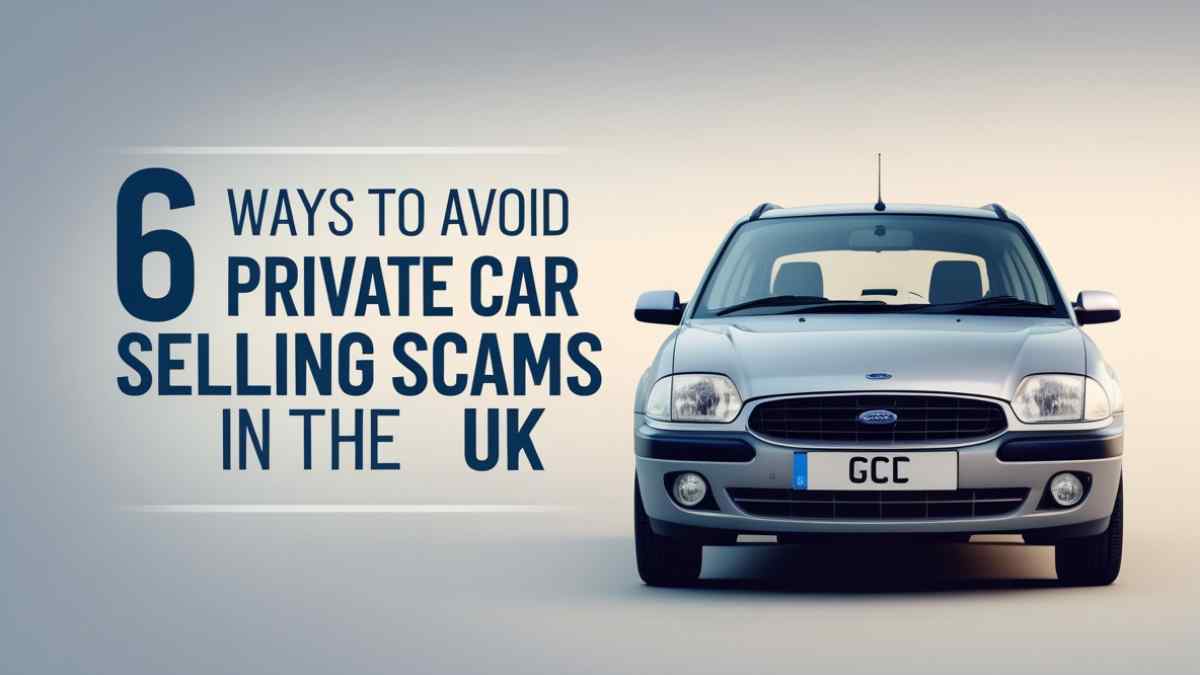6 Ways to Avoid Private Car Selling Scams in the UK

The digital age has transformed how we sell our cars. Online platforms offer incredible reach to potential buyers. Unfortunately, they also offer a means to reach for scammers. Fake payments, identity theft, and even vehicle theft are real threats every seller should understand.
Fortunately, you can protect yourself completely. By staying vigilant and informed, you can confidently navigate the sale. You will secure a great price without compromising your safety or finances.
This guide will walk you through six essential strategies. These actionable tips will help you spot red flags and prevent common scams.
Understanding the Modern Scam Landscape
The shift towards online car selling has been a double-edged sword. It connects you with a vast pool of genuine buyers. It also connects you with fraudsters using increasingly sophisticated tactics. These criminals exploit the trust and excitement of sellers. They create a sense of urgency to pressure you into making mistakes.
Common scams often follow predictable patterns. Some involve fake payment methods, where the money you receive is not real.
Others involve complex stories designed to trick you into handing over your car for nothing. Personal safety can also be a concern during in-person meetings.
Awareness is your most powerful weapon. Familiarising yourself with these common schemes drastically reduces your risk. You can identify warning signs early. You can then take necessary precautions to ensure a secure and smooth transaction. Knowledge truly is power in this situation.
Steering Clear of Financial Scams
Financial scams are perhaps the most common threat to private sellers. They aim to trick you into believing you have been paid.
In reality, you end up with nothing but worthless transactions. Recognising these financial traps is crucial for protecting your money.
The Fake Payment Trap
Fake payments are a favourite tool for scammers. They may present a fake bank transfer receipt, hoping you will not verify the funds.
Another version is the overpayment scam. Here, a buyer sends an inflated payment and urgently requests a refund for the excess amount. The original payment then bounces, and you lose the refunded cash.
Always wait for the funds to clear in your bank account. Do not trust screenshots, emails, or receipts as proof of payment.
They are easily forged. Only the confirmation from your own bank is reliable. A legitimate buyer will never pressure you to refund money quickly.
The Perils of Counterfeit Cash
Paying with counterfeit cash is another prevalent form of fraud. Scammers use high-quality fake notes that can be difficult to detect.
They often try to rush the transaction. They may use distractions to prevent you from carefully inspecting the money.
To protect yourself, familiarise yourself with the security features of genuine banknotes. Look for watermarks, holograms, and security threads.
Examine each note carefully under good light. Consider using a UV light or counterfeit detection pen for added assurance. If something feels off, trust your instincts.
Ensuring Physical Safety and Preventing Theft
While financial loss is a major concern, your personal safety is paramount. Scams are not always just about money. Some are designed to steal your car or worse. You must take proactive steps to protect yourself during viewings and test drives.
The Test Drive Scam
A classic scam involves criminals posing as very interested buyers. They may arrive with a friend to create a dynamic that feels less suspicious.
During the test drive, one tactic is to create a distraction and drive off with your vehicle. Another is to swap the keys for a fake set.
Always verify the buyer’s identity and insurance before any test drive. Do not let them drive alone. Insist on being in the passenger seat.
Furthermore, do not hand over the keys until you are physically inside the car. Keep hold of your main set if you use a spare for the drive.
Tampering and Intimidation
Shady buyers may try to tamper with your car during an inspection to lower its value. They might add oil to the coolant tank to simulate a serious fault. Their goal is to pressure you into accepting a much lower price on the spot.
Stay with the buyer at all times during the inspection. Keep the car locked if you need to briefly step away. If the buyer becomes pushy, aggressive, or the situation feels uncomfortable, you have the right to cancel the sale immediately. Your safety is more important than any transaction.
Mastering Digital and Documentation Security
In our connected world, scams are not always face-to-face. Your personal information and the way you handle documentation are also targets.
Protecting your digital footprint and official paperwork is a critical layer of your overall defence strategy.
Choosing Secure Payment Methods
The safest way to accept payment for your car is via a direct bank transfer. It provides a traceable record of the transaction. You only need to provide your account number and sort code. You never need to share your card details.
Once the transfer is initiated, wait until the funds are visibly in your account. Modern transfers are typically instant. Be very wary of anyone who claims a payment will be “pending” for several days. This is a common lie. Do not part with your car or its documents until you have confirmed the money is safely with you.
Protecting Your Identity and Documents
Identity theft is a real risk when selling your car. Fraudsters may pose as buyers just to get your personal details from your documentation. They can use information from your V5C logbook or driving licence for fraudulent activities.
Only show the necessary paperwork. The buyer needs to see your V5C logbook, MOT certificates, and one form of photo ID, like your driving licence.
Do not let them take photographs of these documents. If they want to verify the car’s history, they can independently run an HPI check.
Exploring Safer Selling Alternatives
For those seeking a more secure and straightforward path, remember that reputable car-buying platforms exist. Whether you use a service like We Buy Any Car or another platform, you are choosing a safer, more controlled selling environment.
Professional car-buying services offer a secure, hassle-free option. These companies handle the entire transaction. They provide established processes that eliminate the risk of fake cash or fraudulent payments.
Your personal safety is never a concern because you are dealing with a professional business. The convenience they offer is often well worth it for the security and time.
Final Thoughts
Selling your car privately in the UK does not have to be a risky endeavour. You now possess the knowledge to protect yourself effectively.
Remember the core principles we have discussed. Be sceptical of deals that seem too good to be true. Always verify payments directly with your bank. Prioritise your safety during all in-person meetings.
Stay vigilant against digital and document-based scams. Do not rush the process, no matter how much you are pressured. Trust your instincts above all else. If a situation feels wrong, it is okay to walk away. You are always in control of the sale.
Ultimately, your awareness is the key to a successful sale. It protects you from financial loss. It ensures your personal safety. It grants you the peace of mind you deserve. Take these tips to heart, and you can turn the process of selling your car into the positive and rewarding experience it should be.



